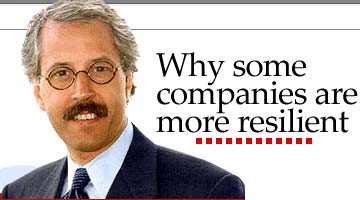
According to The Economist, he is the 'world's reigning strategy guru.' The Financial Times writes, 'His habit is to create rule-breaking strategies that have generated billions of dollars in new wealth.'
In 1994, he co-authored Competing For The Future with management guru C K Prahalad, which introduced the path-breaking concept of 'core competency.'
Today Gary Hamel is undoubtedly one of the world's most sought after speakers: on the rare occasions he does agree to give a talk, his pull ensures huge audience turnout.
In 2000, Hamel wrote Leading the Revolution, a book which leapt on to CEO desktops but did not shake up the world.
Has Hamel, working alone, fared as well or better, than Hamel working in partnership with Prahalad? Has he run out of steam, or worse, burnt himself out?
Hamel shrugs. "I am a contrarian, and get on with my work. Our little group [referring to Strategos, a consultancy he founded] has created more per capita, more new wealth and more organisations, than people imagine. We have created an enormous amount of new management practice which is now getting written about. I am pretty pleased with what our group has done," adding wryly, "but if you ask me one thing I have learnt, is probably to talk less and listen more!"
Open to criticism, able to look at himself in the mirror, actively involved in K.I.D.S. (Kids in a Drug-Free Society), Hamel's interest in management theory stems from his raw years as a doctoral student at the University of Michigan. This was in the late 1970s, a time when the US auto industry was being hammered by new competitors.
"I saw neighbors who lost their jobs, families who lost a bread winner, and people forced to sell their homes and so on. . . that's when I really understood the human consequences of poor management, that management is not some abstract concept, that it's not measured in the P&L statement."
Second, "I learnt to have a very healthy skepticism about the value of perceived wisdom, because the CEOs, these Gods, had been in the auto industry for 40 years. The red carpet was always out for them. They were constantly flying around in their airplanes. And yet people were losing their jobs."
By his own admission, he does not read management books, "but I read a lot about other disciplines." New insights come from political science, complexity theory, biology, religion and spirituality, "because when you have been at one game -- the strategy discipline -- as long as I have, stimulation can only come from looking elsewhere."
His new research focuses as usual on innovation, but more importantly looks at resilience and how managers and firms can survive and grow in turbulent times.
Interestingly, he draws lessons from biology and the politics of democracy. The Smart Manager caught up with the elusive thought leader in London for a freewheeling, no holds barred interview.
Where do ideas come from? I do not see new ideas coming from business schools, I do not see them coming from consultancies.
Many companies around the world are not only retrenching operationally, they are retrenching intellectually. There is almost an airtight intellectual climate, with an enormous amount of skepticism about new ideas. I would like to answer your question from the demand side and from the supply side.
From the demand side, in a hugely difficult economic environment, a lot of companies are just fighting fires. They are retrenching and trying to get cost structures in line with the newly diminished levels of demand. Many feel that they were naïve in believing a lot of what they were told, particularly where e-business was concerned.
From the supply side, people are finding that back to basics can only take them so far, because the basics are simple. Every company wants to grow its revenues, take costs out, and raise prices over time.
But more and more organisations are in a situation where they are in a slow growing market and you cannot grow revenue by selling the same thing to the same people in the same way.
Demand will come back if there are new ideas whose performance consumers like. I am more worried about the supply side. You said that new good ideas are not coming out of B-schools, and I agree. I have been saying at least for a decade that B-schools are losing their share of intellectual leadership, and they are losing it to consultants and managers.
I believe there are two reasons -- there are many -- but let's focus on two.
First, most B-school research is not aspirational. The only way you invent something new is to imagine how you think organisations should be, or could be, and where they aren't today, and then ask how do you help them get there. For example, I find WM Edward Deming, a founder of the quality movement, much more compelling than Peter Drucker.
Peter was a sage, and I am sure he was helpful in a lot of cases. But Deming changed management practices all around the world in ways that created enormous advantages for customers and companies.
When he started talking about zero defects, there was no reason to believe that it could be done. It was truly something that was almost beyond imagining. Then he worked to invent the tools: the matrix, the training, to make it all possible.
Second, B-school research is not experimental. In most of the sciences, research is experimental. Whether you are psychologist or a physician or a biologist, you take a control group, you try something, and you learn. B-schools do not go into organisations and develop hypotheses. If research is not aspirational and not experimental, it can't be inventive.
A lot of B-school research falls into one of two categories. It's either philosophical musings: wouldn't it be nice if this happened. Or it is pedantic surveys of best practice. You look at an average management book [from a management faculty] and what is it? Other companies have done this, you too can do this. That is what consultants should be doing, not what scholars should be doing.
Scholars should be imagining the possible and inventing it. Let the consultants transfer the obvious from one company to another. If there is a supply problem today, it is because so much of management research has largely become irrelevant.
. . . and consultants?
Consultants have a slightly different dilemma. Consulting organisations have to feed a lot of mouths, and the kind of research I am talking about will not feed a lot of mouths. Companies willing to say, 'Let's take a risk, let's experiment with something that has never been done before' are limited in number.
You need managers who have the courage and the vision, and they are few. The whole consulting model is built on finding some tool or process that can be replicated a hundred times across organisations. For new ideas, every single situation will be new.
You try something for the first time or the second time, but you will never try it the fifth time because by then you know.
I have been inside many consultancy companies. They seldom invest in any tool or any learning ahead of a client's demand. If Coca-Cola calls up and says we need this, then and only then they go out to find out. But gee, they don't start by saying, 'What should Coca-Cola be asking for? What have they never thought to ask us?' They don't have the courage, they don't have the imagination, they don't have the guts to go do this.
However consultancies have a very useful social value: the transfer of management wisdom, one which creates a competitive environment, one where customers win the most -- not the clients.
Be it supply chain integration or customer relationship management, as a consumer, every day I am grateful that there are consultants out there in the world who are taking ideas from Company A to Company B to Company C to D to E because my life gets better and better.
What we need is a hybrid between consulting and academia. It's largely why I like to describe myself as a consultant and don't describe myself as a traditional business school researcher.
I am an experimenter, I am an inventor. I like to go in, and I have a point of view, and we try something and see if that works. If it does, we write about it. If it does not, we quietly sweep it under the rug. To play that role requires several qualities. First you have to have a vision for what could be. Second, you have to be empathetic about what life is like for people in organisations.
You have to understand their frustrations and their fears, and what drives their success. Otherwise you come in, and you're arrogant, and you ask to do things that they cannot do, or are not really in their interest. I don't think most consultants are emotionally empathetic.
If you strip away the rhetoric, their real job is to make the world safe for senior vice presidents or divisional directors. Third, you have to have access: you have to have companies that trust you enough to let you do this.
From 'core competency' to 'resilience', tell us about your new work. What do companies have to do to survive our turbulent times?
Any organisation that hopes to become resilient must address four challenges: cognitive, strategic, political and ideological.
To meet the cognitive challenge, a company must be conscious of what's changing and be continuously free of denial, nostalgia and arrogance.
Resilience requires alternatives as well as awareness -- the ability to create a plethora of new options that provide compelling alternatives to dying strategies.
In terms of the political challenge, the organisation must be able to divert resources from yesterday's products to tomorrow's.
The ideological challenge is perhaps the most difficult of all - few organisations question the doctrine of optimisation, but optimising a near irrelevant business model can't secure a company's future.
Renewal has to become continuous and opportunity driven rather than episodic and crisis driven.
Let's take these one by one. How do you meet the cognitive challenge?
Every business is successful until it's not. What's amazing is how often top management is surprised when 'not' happens. Often even unexpected shocks can be anticipated -- if one pays close attention.
Take the IT industry and the makers of computer gear. Three body blows knocked them out: the telecom sector imploded under the pressure of mounting debt; a horde of dot-com customers ran out of cash; and large corporates slashed budgets as the economy went into recession.
Is it fair to expect IT vendors to have anticipated this storm? Yes.
Fledgling telecom outfits were building fibre optic networks far ahead of demand, buying equipment with vendor financing. Similarly, vendors knew that the vast majority of dot-com customers were burning cash at a ferocious rate with no visible earnings.
As for corporates, in 1990 US companies spent 19 per cent of their capital budgets on IT, by 2000, they were spending 59 per cent. Anyone looking at the data should have been asking, will capital spending keep growing at a double digit pace? Logically, the answer has to be, no.
Meeting the cognitive challenge means conquering denial. And that means three things. First, senior managers must make a habit of visiting the places where change happens first.
It's easy to discount secondhand data reading about change from a business magazine, hearing about it from a consultant, getting a report from an employee -- but it's hard to ignore what you have experienced first hand. Then take time to think through the second and third order consequences of what you have seen.
Second, filter out the filterers. There will be people in your organisation who understand what's changing and its con-sequences. Find them. Also find and remove the censors, the custodians of convention.
Talk to potential customers who aren't buying from you. Create a shadow executive committee whose members are twenty years younger than the 'real' executive committee. Third, recognize the inevitability of strategy decay. Bill Gates remarks that Microsoft is always two or three years away from failure. The message to his organisation is clear: change will make irrelevant at least some of what Microsoft is doing today and it will do it sooner than later.
It's difficult to admit that a dearly beloved strategy has gone from ripe to rotten. Strategies decay in four ways: by being replicated, supplanted, exhausted or eviscerated.
Over time, all strategies can be replicated. As they lose distinctiveness, so also they lose their power to produce above average returns and margins collapse. Good strategies can be supplanted by better strategies.
One company's creativity is another company's destruction. And it's happening faster in a connected world where ideas and capital travel at lightning speed. Strategies get exhausted as markets get saturated, customers get bored, or optimisation programmes reach the point of diminishing returns.
Take Nokia, for example. As the number of active mobile phones climbed from 91 million in 1995 to 1 billion today, Nokai rode this growth curve more adeptly than any of its rivals but its own growth curve is beginning to flatten out.
Ultimately, every strategy exhausts its fuel supply. Finally, strategies get eviscerated. Today power has migrated from producers to consumers. Increasingly it's your customers, and not your competitors, who have you -- and your margins -- by the throat.
. . . so how do you meet the strategic challenge?
By valuing variety. The arithmetic is clear: if the range of strategic alternatives being explored by your company is significantly narrower than the breadth of change in its environment, your company is going to be a victim of turbulence. You need to experiment with innovation.
Take Whirlpool, the world's leading domestic appliances company, as an illustration. Whirlpool competes in an industry which is both cyclical and mature. Growth is a function of housing starts and product replacement cycles.
Customers tend to repair rather than replace their old appliances, especially in tough times. Mega retailers like Best Buy squeeze margins mercilessly. Customers exhibit little brand loyalty. The result is zero sum competition, steadily declining real prices, and low growth.
In 1999, its chairman, Dave Whitman, launched an initiative to make innovation a core competency within the company. He recognized that the best way to protect Whirlpool was to generate a wide assortment of genuinely novel strategic options.
Over the next three years, 10,000 of its 65,000 employees scouted for breakthroughs, generating 7,000 ideas, leading to 300 small-scale experiments, which in turn led to a stream of new products and businesses.
Big companies tend to make big bets. Sometimes they pay off, often they don't. When audacious strategies fail, companies often react by imposing tough cost cut-ting measures. Neither profligacy nor privation leads to resilience.
Most companies would be better off steering clear of grand imperial strategies and instead devoting energy to fostering lots of low risk experiments or startlets.
Our experience suggests that a large company or business unit -- say between $5 billion and $10 billion in revenues should generate a minimum of 100 ground breaking stratlets every year, with each one absorbing between $10,000 to $20,000 in first stage investment.
Such variety need not come at the expense of focus but there is simply no other way to reconnoiter the future. Most experiments will fail. The issue is not how many times you fail, but the value of your successes when compared to your failures and how well the portfolio performs.
. . . and what about the political challenge?
In most organisations, a manager's power correlates directly with the resources he or she controls. Hence managers typically resist any attempt to reallocate 'their' capital and talent to new initiatives. Yet resilience demands resources to support a broad array of experiments.
Ironically managers seldom have to defend the risk they are taking when they pour good money into a slowly decaying strategy or over fund an activity that is already producing diminishing returns.
A persistent failure to distinguish between new ideas and risky ideas reinforces the tendency to overinvest in the past.
The fact is novelty implies nothing about risk. Risk is a function of uncertainty, multiplied by the size of one's financial exposure. Newness is a function of the extent to which an idea defies precedent and convention.
For example, Starbucks' debit card, which allows regular customers to purchase their daily caffeine fix without fumbling through their pockets for cash, was undoubtedly an innovation for the quick serve restaurant industry.
Yet it is not altogether clear that it was risky. The card provides a solid customer benefit and relies on well proven technology. It was an immediate hit. Within 60 days of its launch, customers snapped 2.3 million cards, providing Starbucks with a $32 million cash float.
To complete this discussion, how should managers meet the ideological challenge?
The modern corporation is a shrine to a single 100-year-old ideal: optimisation. The goal is do more, better, faster, cheaper. This ideology and its elaboration into values, metrics and processes has created enormous material wealth. But it is no longer enough. McDonald's has a famous slogan: billions served. But what happens when billions want something different?
Optimisation becomes inadequate. Resilience can come only from embracing paradox.
In struggling to embrace the paradox between the relentless pursuit of efficiency and the restless exploration of new strategic options, managers can learn something from constitutional democracies and how countries such as America manage the paradox of unity and diversity.
As an inventor, as a thinker and as an entrepreneur who has founded his own company, what are your key learnings and what would you have done differently?
I would have given more people more chances to second-guess my decisions.
The big mistakes a company makes are almost never because some lower level employee had a crazy idea and did something. The biggest mistakes are made by the people at the top. When my little organisation has made a mistake, it's generally been because I was not open enough to be challenged.
I don't think I actively scotch debate, but partly because of my gray hair, my age and my reputation, people give too much benefit of doubt. They should challenge harder, push harder. It's as much their bad expectations as it is my bad behavior. I am pretty pleased with what our group has done, but if you ask me one thing I have learnt, it's to talk less and listen more.
In the business of wisdom, how do you have impact?
I leave it to others to judge whether I have had any real impact in management but I do think, in some small way, I have learnt something about what it takes to make an impact. It's not about intellect -- that's the least of it -- but be it in academics or in a company or in politics, in my experience, four things helps you have an impact.
First, whatever you are working at, however trivial, put it in the context of a truly big problem.
Take, for example, the famous eye hospital in India. The surgeon there was not just doing a lens implant, he was working on how to improve the sight of the people in India, on how to deliver medical care to those who cannot afford it.
For impact, you have to be constantly be looking for ways to escalate: I have solved this, now how do I solve something bigger? Or how can I help? So you never become locked in a closet and you cannot see the new horizons and new possibilities.
Second, you have to be a contarian but a constructive one. It's not about being an anarchist but being an activist. People who have impact are always looking for what's not there, what has not been said, what has not been done.
Third, you have to have empathy. People should actually believe in you, be willing to take a risk with you and let you take risks with them. They should believe that you are emotionally vested in their success, that you are not conducting an intellectual exercise at their expense. That you are out there to help them, to do something together, not you getting richer.
Fourth, use language carefully. Many academics don't have impact even though they write some very smart things because they don't create the simple language that allows people to handle very complex ideas.
A term like core competence is a handle. Of course it can be trivialized, and people use it in all kinds of ways, but it's a pretty complicated idea. It's like a big, ungainly package with a small handle, one which you can pick up and carry with you. The danger is wordsmithing, or creating buzzwords for its own sake.
People with impact struggle and struggle to say complicated things in simple ways that allows people not be afraid to experiment and try. At least that's something I've learnt, what I tell my children.
The author is the Managing Editor of The Smart Manager.Published with the kind permission of The Smart Manager.








More from rediff